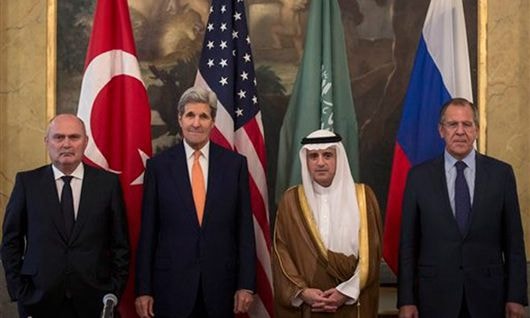One month of Russian involvement in Syria: The "two-in-one" continuous battle
Looking back at Russia's military intervention in Syria over the past month, it is not difficult to see that Moscow has always been the one taking the initiative, with smooth steps placed within an overall, interconnected strategy.
Russia’s military intervention was launched on September 30, after Moscow received an official request from Damascus. Russian leaders declared that the air campaign was aimed at eliminating terrorists, helping to stabilize the situation in Syria, paving the way for a solution to end the crisis in this country. Maintaining the regime of President Bashar al-Assad or protecting its interests in Syria is something that Moscow has not said publicly and left the US and its Western and regional allies to figure out. However, Russia’s move surprised all “opponents”, even though they knew about Moscow’s previous troop movements.
| Russian aircraft participate in airstrikes against terrorists in Syria. Photo: AFP |
The Kremlin has also affirmed from the beginning that this involvement is limited, lasting about 3-4 months, using only air power, not deploying infantry to directly fight on the battlefield. Notably, having just launched airstrikes, Russia has emphasized that it always welcomes a political solution to the years-long civil war in Syria. Later developments show that Moscow has simultaneously opened two military and diplomatic fronts in the "Syria card game", in which the military is the key lever to steer the parties involved to the negotiating table where Russia is the leading decisive factor.
The war against terrorism was carried out systematically by Russia. Moscow had created an alliance right before launching the military attack, with the participation of Russia - Iraq - Syria - Iran. The airstrikes took place with great intensity, in a "surgical" style, with great precision, using high-tech weapons.
By suppressing with air power, Russia created a situation for the forces loyal to President Assad to accelerate a large-scale counter-offensive campaign in the south and west, regaining control in many areas from the hands of terrorists and rebels. The terrorists suffered great losses, with hundreds of command posts, training camps, underground fortifications, and ammunition depots being wiped out. Panic and fleeing from their ranks appeared. This result was not only announced by Russia, but also had to be acknowledged by many "enemy" parties.
By airstrikes against terrorists, regardless of the color of these organizations, Moscow has hit the most vulnerable point of the opposing sides. On the US side, the effectiveness of Russia's airstrikes has made the public question the nature of the war against IS terrorism launched by the US and its allies for over a year, is it a goal or a tool to achieve political calculations?
Türkiye and Saudi Arabia, the two main sponsors of the opposition in Syria, have their own concerns - the wave of "migration" of terrorists after fleeing Syria and Iraq due to "hot" beatings. The Ankara government is currently struggling to fight extremists of the Kurdistan Workers' Movement (PKK), and now with the added concern of IS, it will be really overloaded. As for Riyadh, the infiltration of terrorists along with the rising level of resistance in the Shiite minority community could put the Saudi dynasty on the verge of collapse, especially when social conflicts are "resonant" with economic difficulties due to plunging oil prices.
 |
| Foreign ministers of Türkiye, the US, Saudi Arabia and Russia at a four-way meeting on October 23 in Vienna (Austria) to discuss the Syrian conflict. Photo: AP |
In Europe, the constant war and fighting in Syria will certainly increase the flow of refugees and migrants to the old continent, putting the entire EU bloc under great pressure regarding security, internal politics in each member country, and the spirit of solidarity within the bloc.
Russia’s calculations and actions have pushed the parties involved into a difficult situation, forcing them to make diplomatic moves. That is why high-ranking officials from the US, EU, Saudi Arabia, Turkey and the EU have repeatedly consulted and contacted Moscow. All “players” must now acknowledge Russia’s role and return to a political solution to end the Syrian crisis, based on a common foundation of eliminating terrorism and the next step is a period of “political transition” - in line with the spirit of the Geneva Declaration (June 2012) on ending the conflict in this Middle Eastern country.
Russia has achieved many results after a month of involvement in Syria, especially in terms of prestige and position. But the next part of the work may be much more difficult. That is, how will Moscow coordinate its interests and accept a "price" in the upcoming negotiations, especially when it comes to the most thorny issue - President Assad's political future?
According to Baotintuc.vn
| RELATED NEWS |
|---|
